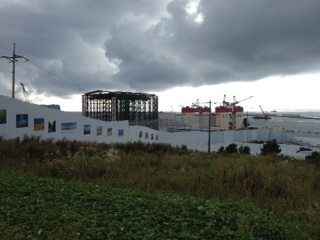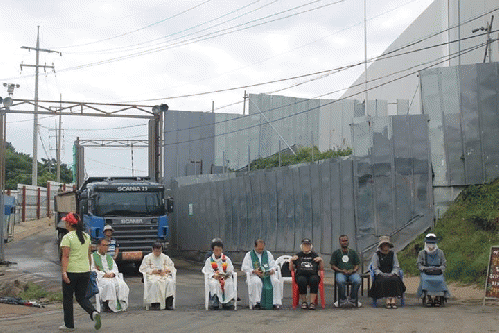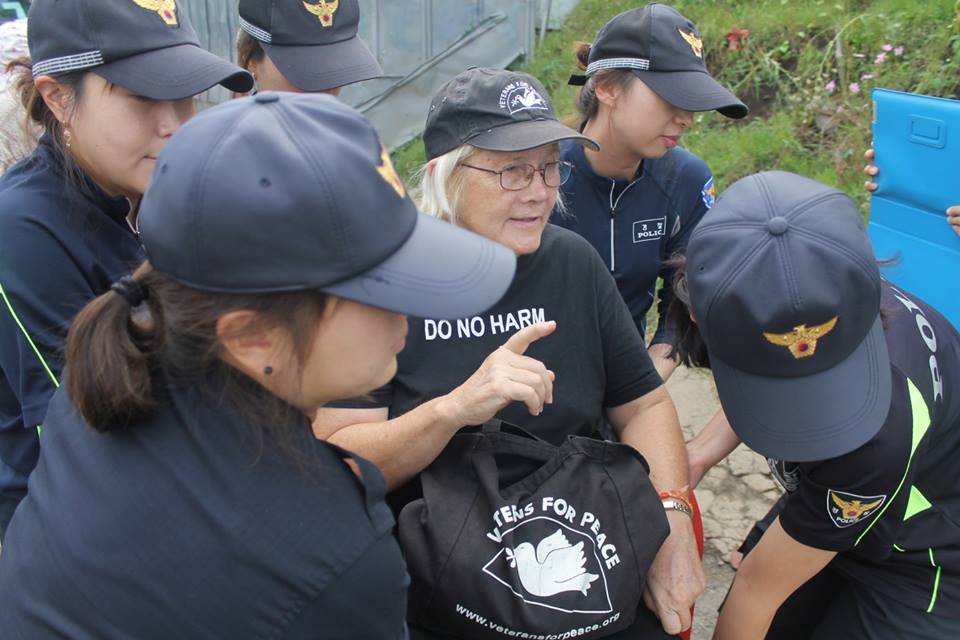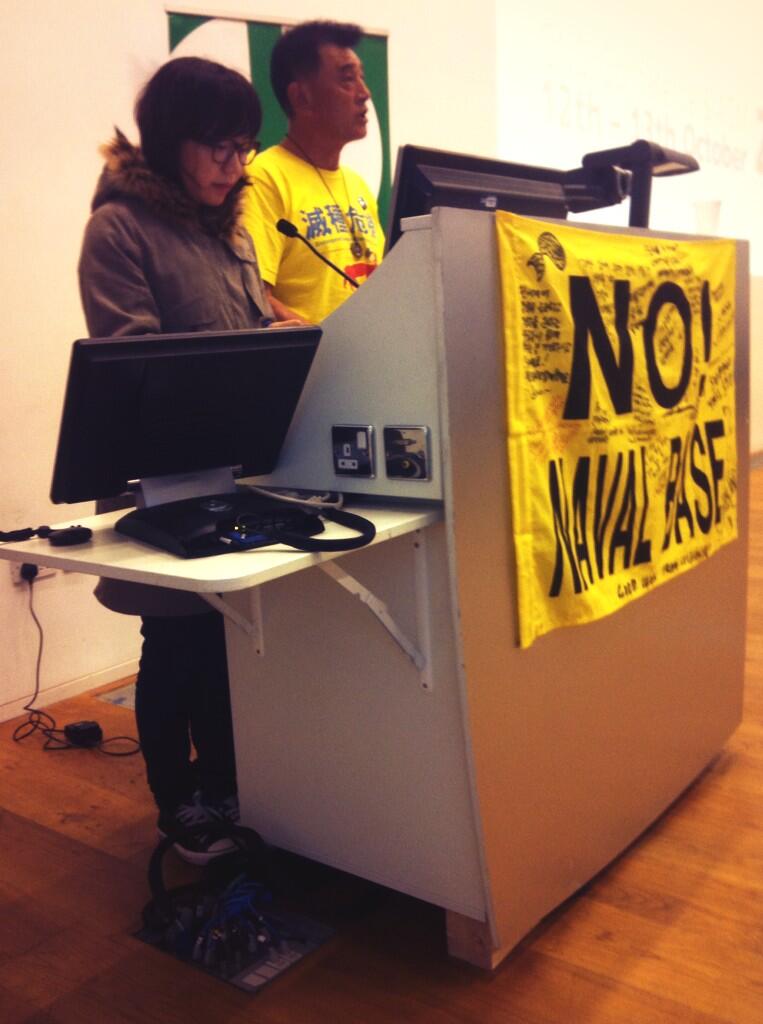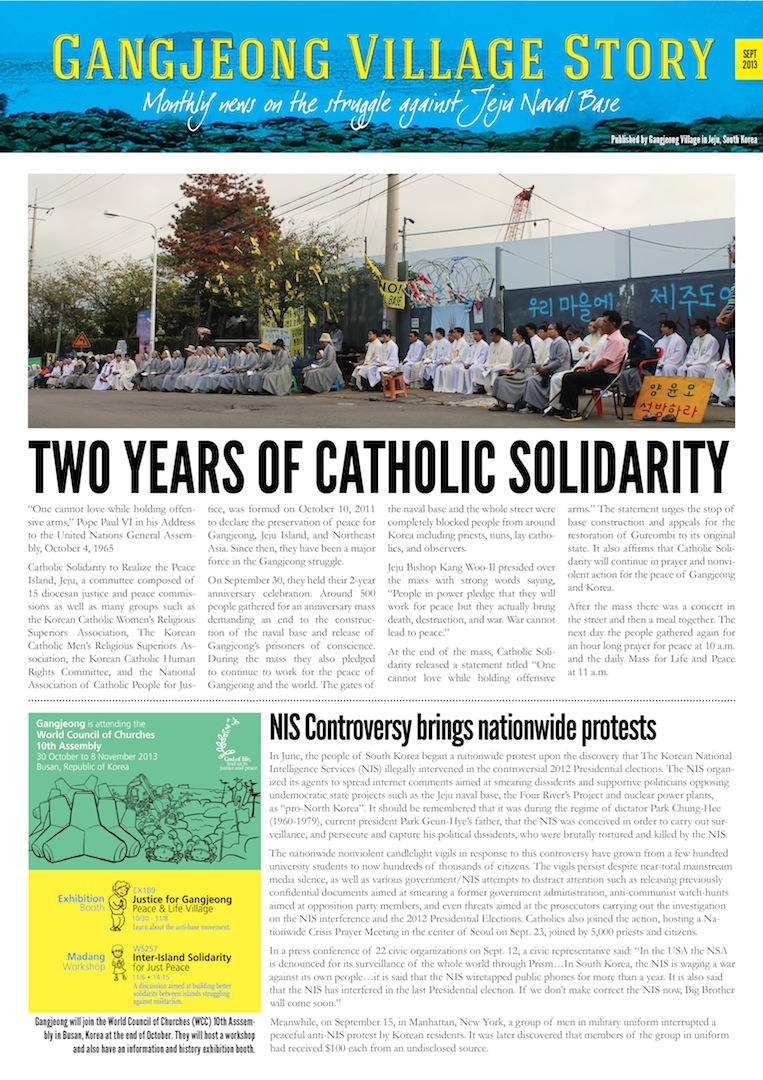Fwd by Pamela K Brubaker, Professor Emerita of Religion, California Lutheran University
To see the PFPL statement, ‘In Solidarity with Gangjeong Villagers Say No to the Jeju Naval Base!’ go to HERE.

Affirming Life Together in the Face of Belligerent Empire
We the participants of the 3rd Peoples Forum of Peace for Life gathered at the April 3rd Peace Park in Jeju Special Self-Governing Province in the Republic of Korea from 23rd to 27th of October 2013. We had a women-led solidarity mission to Jeju and to Gangjeong Village, and shared common experiences of threats to life in our respective societies and throughout the world. Inspired by our faith traditions’ shared affirmation of life, we issue this call to solidarity and action.
In Solidarity with Gangjeong Villagers and Say No! to Jeju Naval Base
We note with concern that the government of the Republic of Korea has enforced a naval base construction in Gangjeong village, Jeju Island since 2007, without proper consultation with villagers and consideration of villagers’ right to environment, land and peace. We are distressed to witness how a large-scale development profiting big corporations can destroy peace in a village under the name of protecting national security. For seven years the people of Gangjeong village have resisted the base construction and suffered unjustly from abuse by authorities in response to their non-violent campaign against the construction of a naval base which will militarise the sea of East Asia. We witnessed the strong resistance of the historic tradition of Jeju women lived out in the Gangjeong village struggle against the base construction. They have been accompanied by activist groups from around the world. The Catholic Church, in particular, has been a presence for the last two years, offering mass every day to draw attention to this travesty.
We, the participants of the 3rd People’s Forum, stand in solidarity with the people of Gangjeong village in their peaceful struggle against maritime militarisation. Jeju people have a full right to resist the repeat of the last century’s tragedy, the April 3rd massacre in 1948 of tens of thousands of Jeju islanders. The people of Gangjeong village present a strong call to open a new era of peace and cooperation in East Asia for themselves and for all of us.
The Not-so-Innocent Language of Empire: Toward a Counter-Narrative
The emerging US national security state is a symptom of an increasingly desperate empire seeking to maintain its hegemony, harming the living conditions of many of its own and other peoples while repressing dissent at home and in politically “hot” regions. The imperial system wages war on the people of the world. It is defined by the nexus of the national security state and predatory corporate capitalism.
Beginning with the end of the Second World War, the US led imperial model has been imposed in several parts of the world, in Central and Latin America, the Middle East, Southeast Asia, and Africa. Key instruments of the imperial system are militarization and coups, capture of international financial and trade institutions, neoliberal market economy, and socio-cultural controls of media, communication, and education.
The Empire employs deceptive language and consciousness to legitimize its ambitions. In the solidarity mission to Jeju, we noted the ruthlessness of the innocent-sounding “US pivot to Asia.” Instead of increasing friendly relations with Asia, it involves the new geo-political imperatives of Empire regarding China and the American presence in this economically dynamic region.
Nuclear weapons and nuclear power are two dimensions of one reality, which the nuclear military industrial complex promotes and benefits from. There is no peaceful use of nuclear power (“Atoms for Peace”), as the disaster at Fukushima shows. Forced evacuation of 150,000 people continues, highly radioactive contaminated water has not been brought under control, and efforts to restart nuclear power plants are underway, as well as export of such plants.
The Empire claims to “fight terror”, “protect national security,” and “advance democracy and human and women’s rights.” These discourses of “Western” values advance imperial dominance. Activism for justice and peace is branded as “terrorism”, and Muslims resisting colonization and wars in their lands are termed terrorists. The imperial promotion of human and women’s rights has the opposite effect of what is proclaimed.
We need to expose the moral and political-intellectual bankruptcy of these imperial claims, and advance a counter-understanding of the threats to the lives of both the human- and non-human living world, as well as the life of the planet. We must offer alternative approaches in order to live justly, sustainably, and peacefully in this world.
Toward an Interfaith Praxis of Resistance to Empire
We are at a time when a global, powerful, and meaningful phenomenon like religion can no longer ignore the multiple crises surrounding it and catastrophically affecting its adherents. In particular, the “war on terror” has harmed Muslim-Christian relations in Africa, Asia and the Middle East. One of the most effective legitimating factors for the violence of the powerful in the world today is religion in general, and especially some powerful institutional actors located within the various religious traditions.
This trend needs to change and there are increasing voices which are calling on their religious leaders and communities to rekindle the real liberating spirit and ethos of their religious traditions. This is a time when all of the great, lively religious and spiritual traditions that provide fundamental values of justice, sustainability, and peace are under pressure to be co-opted by the powerful to support ongoing injustice and inequality in the world.
We meet here to affirm that these traditions must have no tolerance for the widespread, unfolding genocide taking place against the world’s peoples, and the concomitant ecocide of our home, planet Earth. The peoples of the world are suffering layer upon layer of injustice and brutality, and our religious and spiritual communities can no longer maintain their silence or just pay lip service to justice and peace. These communities must continue their prophetic and authentic missions of forcefully challenging the empire and its powerful allies, institutions, and policies and practices – in cooperation with like-minded social movements and peoples movements. We call upon our religious and spiritual communities to commit their leadership, constituencies, and resources to mobilize against these trends of domination, subordination, and destruction of peace-loving peoples, societies, and our ecosphere.
Our Common Call
We continue to be inspired by the heroic resistance waged by social movements in Latin America, the Philippines, India and many other places against neoliberalism and US hegemony, and call for meaningful support for and solidarity with these progressive forces.
Inspired by the long history of ecumenical witness for improved North-South Korean relations, particularly between the two Christian communities, we offer our solidarity to a reinvigorated process of dialogue and exchange with a view to generating a political environment conducive for reunification, beginning withrenewed engagement between the two sides to turn the Armistice into a peace treaty.
We urge resistance to financial instruments and trade agreements, such as the Trans-Pacific Partnership, which undermine our commitment to place people and the environment before profit.
We strongly condemn the corporate violence leashed out in Odisha, India, on the struggling communities and the environment by the POSCO company hand-in-glove with the Indian government. We demand the immediate release of people who are arrested and accused on fabricated cases. We demand the withdrawal of POSCO so that the communities can live in peace with nature. We ask the people of Gangjeong village in Jeju and other citizens of Republic of Korea to be in solidarity with the people in Odisha, India.
We call on people of faith and conscience to continue their support of the Arab people’s resistance against tyranny and occupation, and to oppose the regional and global counter-revolutionary political actors denying their aspirations for human dignity and social justice. We especially reaffirm the need for steadfast support for Palestinian national liberation and maintain our commitment to our Palestine solidarity work.
We call on the faith communities to actively combat the rising tide of Islamophobia, which facilitates greater imperial violence against Muslims.
We strongly denounce the growing network of the U.S. military power both through building bases and expanding access through Visiting Forces and Status of Forces Agreements throughout the world, including here in the Republic of Korea, and the accompanying patriarchal and sexual violence, exploitation, and suffering inflicted on women. We are inspired by and give our unconditional solidarity to the heroic resistance waged by women against such barbarism.
We deplore the state and private financing of bloated military budgets and the arms trade, and call for significant reduction in military expenditures and an end to the arms trade, so that these funds may be invested in life affirming programs.
We call on religious communities and peoples committed to peace to condemn the introduction and use of drone warfare, and demand an end to their use.
We affirm movements against nuclear power plants in Japan, India, and many other countries, and support their efforts to hold accountable governments and corporations for harm they have caused.
We call on the peoples of the nuclear armed states and those states protected by them to join with the 124 nations resolving to never use nuclear weapons.
We strongly encourage equitable negotiations between the US and Iran with a view to additional subsequent agreement on the imperative of establishing a Nuclear-Weapon-Free Zone in the Middle East. We affirm that establishing similar zones in South Asia and Northeast Asia is also urgent.
We remain committed to our critique of global injustices and global hegemony, although this in itself does not offer an alternative to the prevailing world order. Alternative structures, institutions, laws and policies must be premised upon an all-embracing alternative consciousness which privileges attitudes and values that the Empire has hitherto ignored or downplayed. Love, for instance, should be foregrounded as a defining attribute of the individual and collective consciousness of the human family. When love begins to shape our behaviour and action in a profound manner, it will have a huge impact upon all spheres of society including economics and politics. For love has the potential to demolish ego-centric attitudes that boost the insane drive for power and wealth that often leads to hegemony.
Adopted 27 October 2013
Jeju April 3 Peace Park, Republic of Korea
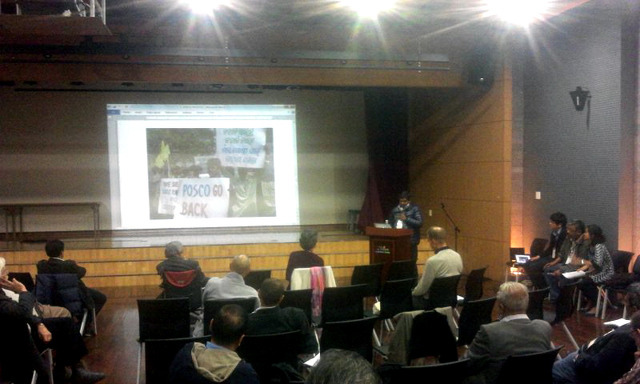
You can see a video presented by him, here. To be co-incident, POSCO is another main company for the Jeju naval base construction. See here. For the two presented videos on people’s struggle opposing the POSCO, see here and here.


